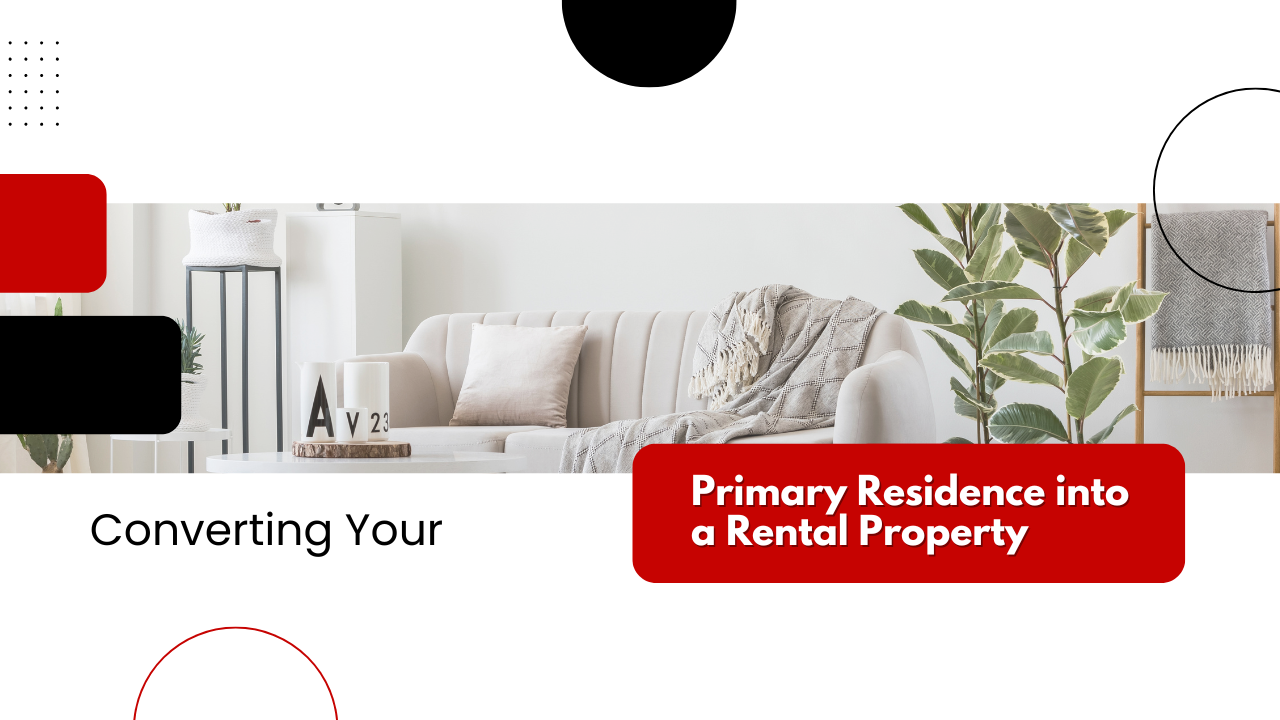Are you leaving your home and wondering what to do with it?
Renting it out can be a great idea, especially for homeowners interested in earning short-term income through rent and long-term returns through appreciation and equity.
Whether moving across town or the country, turning your home into a rental can generate passive income, build wealth, and preserve your asset for future appreciation. However, this process involves more than moving out and handing keys to a tenant.
As professional property managers in the Hampton Roads market, we’ve helped homeowners through this process hundreds of times. We’re using our experience to share everything you need to consider when converting your primary residence into a rental property. This includes legal and financial considerations, home improvements, and tenant management.
Quick Overview:
|
Making a Case for Renting Out Your Home
Why not just sell the home and move on?
There are many excellent reasons to hold onto it and use it as a rental property for a few years or until you’re ready to do something else with it. For starters, it will provide steady passive income. Renting out your property provides a consistent cash flow, which can help cover the mortgage, property taxes, insurance, and other maintenance costs. You’ll also be able to use this valuable real estate to build wealth. By holding onto the property, you can benefit from long-term appreciation. The home may increase in value over the years, allowing you to sell it for a profit later.
Tax benefits are available to rental property owners, too. As a landlord, you’ll qualify for tax deductions that can offset your rental income. These may include deductions for property maintenance, repairs, and depreciation.
Renting out your home provides flexibility. You can return later if your plans change, or you can continue renting it for years to come, generating income in the process.
Assess Whether Converting is Right for You
Before making significant decisions, you should assess whether converting your home into a rental is right for your financial and personal situation. Establishing that your home will make a good rental property is also essential. Is there any reason tenants won’t want to rent it?
Consider the following:
Market Conditions. Research your local rental market. Are rental prices rising or stable? Is there high demand for rental properties in your neighborhood? Understanding these factors will help you gauge potential rental income.
Your Financial Situation. You need to ensure that converting your home into a rental property won’t bind you financially. Factor in the cost of maintaining the property, paying your mortgage (if you still have one), and any additional expenses that may arise.
Long-Term Plans. Renting it out can make sense if you plan to relocate temporarily and may want to return to your home in a few years. However, if you’re making a permanent move and don’t plan to return, selling might be a better option.
Review Your Mortgage and Insurance Policies
Once you convert your primary residence into a rental property, you should examine your mortgage and insurance policies.
Mortgage Considerations
Some mortgage lenders require you to live in the home for a specific period before you can rent it out. Check your mortgage terms to ensure you’re not violating any clauses. If you have a conventional mortgage, you may be able to switch to a landlord-friendly loan. In some cases, you might need to refinance.
Insurance
A homeowner’s insurance policy doesn’t cover rental activities. You’ll need to switch to a landlord or rental property insurance policy, which will provide coverage for damages caused by tenants, liability protection, and potential loss of rental income. Be sure to also check with your insurance company about any additional requirements they might have.
Make Necessary Repairs and Updates
Your home may have been perfect for you, but it’s important to remember that tenants have different needs. They’ll expect certain features, amenities, and overall conditions to be up to standard. You can’t leave maintenance issues until later. Here's how to prepare your home for the rental market:
Repairs and Maintenance. Fix any outstanding maintenance issues. Check for leaks, broken appliances, worn-out flooring, or other issues that could create tenant problems. Even minor repairs can make a big difference in the tenant experience and prevent future costly problems.
Upgrade to Increase Rent. If you want to attract high-quality tenants, consider making some upgrades. A fresh coat of paint, new countertops, or modern light fixtures can add value to your property. While these upgrades may require an upfront investment, they can increase your rental income in the long run. Tenants seek convenience, energy efficiency, and smart home technology. Consider these things when you’re choosing where to make improvements.
Safety and Security. Tenants will want to feel safe in their home. Install smoke detectors, carbon monoxide detectors, and secure locks on doors and windows. Depending on your area, you may need to meet specific safety codes or regulations for rental properties.
Landscaping and Curb Appeal. Tenants are visual customers, and your curb appeal will count. Invest in some landscaping to make the property look welcoming and appealing.
Set the Right Rental Price
Setting the right rental price is a massive step towards attracting tenants while ensuring you’re covering your costs. If you set the price too high, you might have trouble finding tenants. If you set that price too low, you risk losing potential income.
Conduct some market research. Look at comparable rental properties in your area. This will help you determine what similar homes are renting for and set a competitive price. However, make sure you’re working with reliable data. Property managers will have the best insights, and we’re talking about management next.
Partner with a Local Property Manager
Managing a property yourself when you don’t have any landlord experience is risky.
When you partner with a property manager, turning your residence into a rental is much easier. You will have a qualified expert making decisions, utilizing technology, and leveraging relationships to ensure your property is leased, managed, and maintained to the highest standards.
Your property manager will find tenants, collect rent, and coordinate maintenance. Property managers typically charge around 8-12% of the monthly rental income, but the convenience is always worth it, especially if you have a busy lifestyle or live far from the property.
We’d be happy to talk to you more about the benefits of working with us at Doud Realty Services.
Leasing: Screening and Placing Tenants and Signing a Lease
Finding a tenant is the next step in turning your primary residence into a rental.
This is important, and we can tell you that the success of your rental property largely depends on the tenants in your property. A bad tenant can lead to missed payments, property damage, or legal issues. Be thorough in your tenant screening process. Any good screening process will include:
Background Checks. Always perform a background check, including credit history, criminal background, and eviction history. This will help you assess whether a tenant is financially stable and responsible.
References. Contact previous landlords and employers to verify the applicant’s rental history and reliability. This provides insight into their character and behavior.
Rental Application. Have a standardized rental application to collect necessary information, such as employment details, rental history, and emergency contacts. A good application will help you decide whether the applicant meets your criteria.
Fair housing laws need to be followed during the screening process. This is another excellent reason to work with property managers. Our system is consistent, objective, and compliant.
Once a tenant is approved, you need a lease. Your lease agreement is the foundation of your relationship with your tenant. It should clearly outline the rental terms, such as rent amount, due dates, security deposit, pet policies, maintenance responsibilities, and what happens in case of late payment or eviction. Ensure the lease is legally sound and compliant with state or local laws.
With all of this done, you can easily make the transition.
 Converting your primary residence into a rental property can be a smart financial move, requiring careful planning, organization, and attention to detail. The process can take time and effort, from securing the right insurance and mortgage terms to upgrading your property and finding trustworthy tenants. With the right approach and help from your property management partner, it can generate significant income and build long-term wealth.
Converting your primary residence into a rental property can be a smart financial move, requiring careful planning, organization, and attention to detail. The process can take time and effort, from securing the right insurance and mortgage terms to upgrading your property and finding trustworthy tenants. With the right approach and help from your property management partner, it can generate significant income and build long-term wealth.
Let’s do this together. Contact us at Doud Realty Services, Inc. We provide expert property management in Norfolk, Portsmouth, Hampton Roads, and surrounding areas such as Virginia Beach, Suffolk, Chesapeake, and Newport News.


